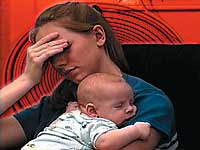
By
ParentingMyTeen.com These are subjects you’ll want to talk about with your children before there is a problem. As a family, you can establish boundaries and consequences and come to a common understanding of what is acceptable.Sex: According to Advocates for Youth, statistics indicate that children who talk to their parents about sex are less likely to engage in high-risk behavior, such as having sex without condoms.
70.6% of teens who reported they didn’t feel comfortable talking to their parents had sex by age 17-19. That compares to 57.9% of teens who reported a close relationship.
It’s true. Not talking to your children about sex isn’t that likely to keep them from doing it. But the opposite is also true. Talking to them about it, isn’t more likely to have them engaging in sexual activity. If it means having sexually active children behaving maturely, talking things out can only help keep our kids safer.
If you think your child is already having sex, chat with them about it. Don’t get angry, but approach it in a calm and reasonable manner. Talk to them about your experiences and be honest. If your child has a boyfriend/girlfriend and things seem to be getting serious, start the conversation if you haven’t already. Above all, make sure they are being safe.
Drugs & Alcohol: Many professionals agree that when parents talk to their kids about drugs and alcohol, those discussions are very likely to shape the child’s attitude about those subjects.
Before you talk to your kids - educate yourself. Check with your local school, library or even look online for the straight facts about drugs and alcohol. Simply telling your kids, “Drugs and alcohol are dangerous,” isn’t going to be as efficient as truly illustrating the very real dangers of substance abuse. Try not to lecture, listen to what your kids have to say and really talk about the issues.
As always, keep it casual. If you spend time with your teenagers and keep the lines of communication open, bringing up the subject is much easier.
Signs of Drug & Alcohol Use: Look out for these tell-tale signs that your child might be using drugs or alcohol:
• Loss of interest in family and other usual activities.
• Not living up to responsibilities.
• Verbally or physical abusiveness.
• Coming home late.
• Increased dishonesty.
• Declining grades.
• Severe mood swings.
• Big change in sleeping patterns..
Understand that a lot of the above signs, especially near the top of the list, could mean a multitude things. Teenagers who are depressed can act in similar ways. When approaching your child, don’t be accusatory. Try to connect with them and see what’s really happening in their lives.
Additional Resources:
Teen Addiction
This anthology presents an examination of the causes of teen addiction and various proposals to reduce or solve the problem, as well as the personal narratives of teens struggling to overcome their addictions.












